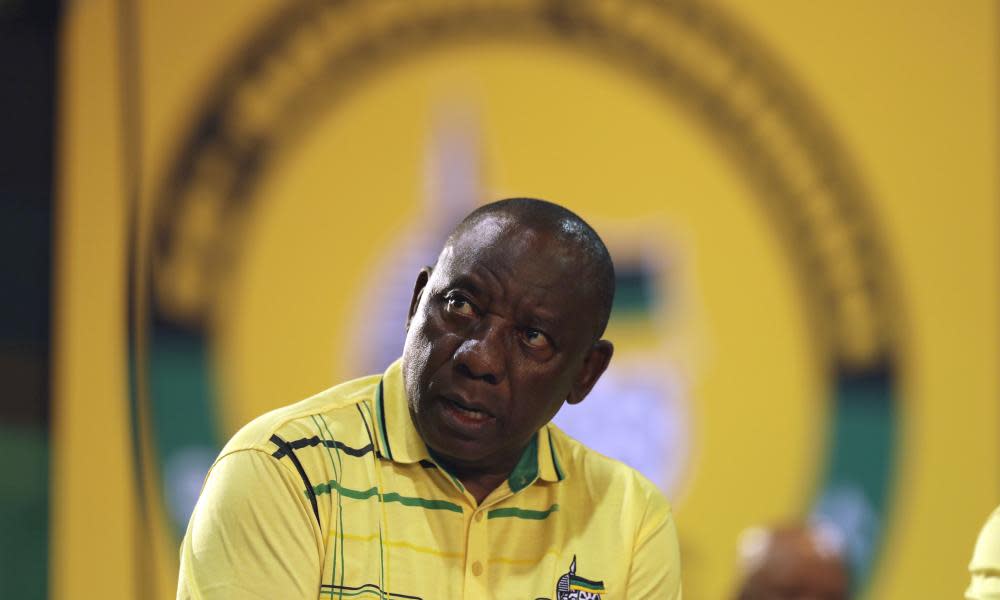Battle to lead ANC and set South Africa's future course too close to call

The battle to lead South Africa’s ruling party remains on a knife edge as almost 5,000 delegates prepare to vote in an election that is likely to determine the country’s next president and the trajectory of the “rainbow nation” for decades to come.
On the second day of the African National Congress’s 54th elective conference, the deputy president, Cyril Ramaphosa, appeared to holda slight advantage over his rival Nkoszana Dlamini-Zuma, a veteran minister and party stalwart.
Ramaphosa, 65, a former trade unionist turned businessman who is seen as the leader of the reformist wing of the ANC, received the endorsement of several senior party officials overnight and may have gained from a decision to bar more than 300 delegates from voting at the conference following legal challenges.
“Let’s just say we are quietly optimistic,” said one supporter who is a senior ANC official.
Few pundits, however, are prepared to predict the result of the poll, which is dominating headlines and news bulletins in the country of 54 million people. The vote has been tarnished by procedural battles, score-settling between factions and fears of fraud.
The two main contenders for the leadership represent dramatically different styles and ideologies, and the choice to be made during the five-day conference is one of the most momentous in South Africa’s recent history, analysts say.
Partisans of Dlamini-Zuma said the 68-year-old was well placed to succeed her ex-husband Jacob Zuma, who gave his final speech as ANC president on Saturday night.
“We are articulating the sentiments of society. This is what is key here. [Dlamini-Zuma] will win but some compromise may be necessary,” said Billy Tsotetsi, an ANC activist and TV commentator.
So far the conference, held in Johannesburg, has seen hours of tense arguments over which delegates should be allowed to vote. These were resolved by midday on Sunday when Jesse Duarte, the ANC’s deputy secretary general, told reporters a result would be announced, possibly by Monday morning.
Duarte said the party had been “extra careful” to check the credentials of delegates to avoid potential legal challenges to the result.
There are concerns, particularly among Ramaphosa supporters, that attempts may be made to bribe the delegates, who have been sent by ANC branches all over South Africa. Each camp has taken measures to restrict access to loyal delegates.
“There is so much at stake and the two candidates are so close in the race,” Amanda Gouws, a politics professor at Stellenbosch University, said last week.
Some analysts see the robust exchanges during the run-up to the conference – which on one occasion involved fistfights and furniture – as evidence of more competitive politics in South Africa.
“It’s been a combative, nasty fight but an open one and that isn’t such a bad thing,” said Antony Butler, professor of political science at the University of Cape Town.
Zuma has led the ANC since 2007 and has been South Africa’s president since 2009. His tenure in both posts has been controversial, with a series of major corruption scandals undermining the image and legitimacy of the party that led South Africans to freedom in 1994 and has ruled ever since.
The next general election is scheduled for 2019 but Zuma may be forced to step down within months. In a speech to the conference on Saturday night, the 75-year-old former political prisoner blamed his many opponents inside and outside the party for the deep problems it currently faces.
Among his critics is Cosatu, a powerful federation of trade unions that has been part of an alliance with the ANC since the last days of the apartheid regime.
Bheki Ntshalintshali, Cosatu’s secretary general, said on Sunday that his organisation was quite clear it was supporting Ramaphosa.
“We need a leader who has the intention of uniting the ANC, uniting the alliance [with Cosatu]. We need a leader who will say the alliance is important,” Ntshanlintshali said.
There are concerns that Dlamini-Zuma will protect her ex-husband from any prosecution if she is elected to lead the ANC and then becomes president.
The ANC still dominates the political landscape in South Africa, but its popularity has been hit by a failure to fulfil expectations that it would transform the lives of the country’s poor.
The party lost control of several cities in municipal elections last year and may be forced into a coalition after the coming national election.

 Yahoo News
Yahoo News 
